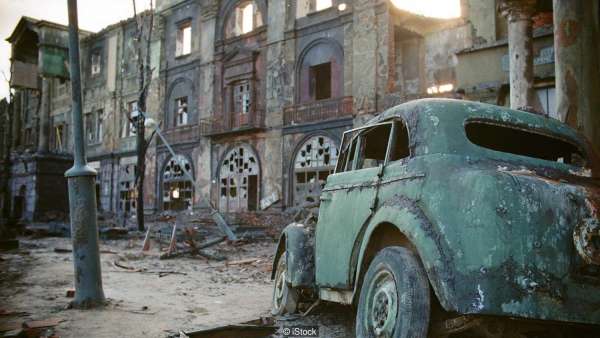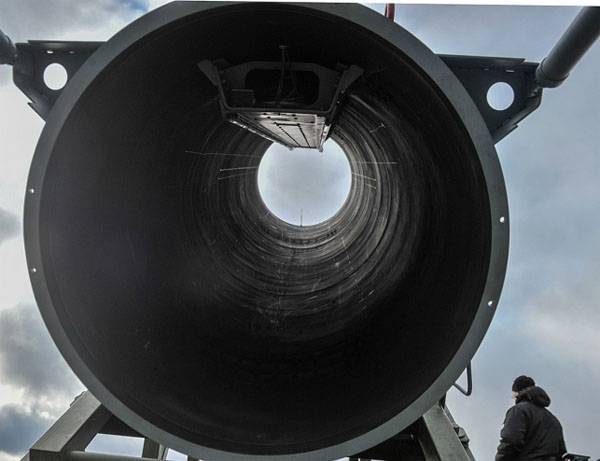Way, on which mankind is walking is dangerous, and our future is hazy, but how close are we to the point of no return? Economist Benjamin Friedman once compared modern Western society to a bicycle, whose wheels are driven by economic growth. If this movement slows down or stops, those pillars will shake, on which our society stands - democracy, personal freedoms, tolerance and everything else. Our world will turn into a disgusting place to live, in which there is a fierce struggle for limited resources, and we will perceive everyone, who does not belong to our inner circle, as hostile outsiders. If we can't get the wheels to turn again, the final social collapse will be inevitable. This has happened many times in history., and no civilization, no matter how great she is, not immune from threats, which can lead to its end. No matter how rosy the present may seem, the situation can always change for the worse. If you take out such force majeure options outside the brackets, like an asteroid fall, nuclear winter or plague pandemic, then a combination of several factors usually leads to the collapse of civilization. What are these factors, and which of them we can already observe today? obviously, what way, on which mankind is walking is dangerous, and our future is hazy, but how close are we to the point of no return?

Inequality protesters set fire to police car. South Africa, 2016 year Although it is impossible to accurately predict the future, mathematics, history and natural sciences can give us some idea of how, what awaits the western world in the long term.
Safa Motesharrei, Systemologist at the University of Maryland, using computer modeling tried to understand the mechanisms, which can lead society to stability or collapse. In work, published in 2014 year, Motesharrei and colleagues argue, that two factors are key: environmental stress and economic stratification. With ecology, everything is more or less clear. Everyone agrees on that, that the depletion of natural resources - groundwater, aggravated by climate change, fertile soil, forest and fish resources - can lead to a global catastrophe. However, then, that collapse can only occur due to economic stratification without the participation of any other factors, turned out to be a complete surprise for Motesharrei and his colleagues.
In this scenario, the elite, accumulating huge reserves of wealth and resources, pushes society towards instability and, in the end, to collapse, since ordinary people, supporting the elite with their work, are left with nothing or almost nothing. In the end the workers give up, since the public goods given to them are insufficient for a normal life, and after that comes the collapse of the elite, because workers don't produce anything else. That inequality, which we see today as inside some countries, and between different countries, indicate the likelihood of just such a scenario. for example, countries, leading in per capita income (first 10%), emit almost the same amount of greenhouse gases into the atmosphere, like the rest 90% countries combined. And about half of the world's population receives less $3 day.
For both scenarios, computer simulations calculated the allowable load - that threshold value, which, with the available resources, will allow to maintain stability for a long time. However, if the permissible load is greatly exceeded, collapse will be inevitable. This fate, but, can be avoided. “If we make smart decisions and get serious about fighting these things, as inequality, uncontrolled population growth, rapid depletion of natural resources and pollution levels, which is quite achievable, then we can stabilize the situation and avoid collapse, - says Motesharrei. - But this cannot be put on the back burner. ".

The collapse of the Roman Empire taught us one very important thing: complexity comes at a price
Unfortunately, some experts believe, that our society is politically and psychologically unprepared for such measures. “In this century, the world will not be able to solve the problem with the climate, simply because it is cheaper in the short term to leave it as it is, what to do to correct the situation, - says Professor Jorgen Randers from the Norwegian School of Management, climate strategist and author of the book "2052: Global forecast for the next 40 years". - The climate will constantly deteriorate, because we will not be able to fulfill the terms of the Paris Agreement and other treaties, concerning greenhouse gas emissions ".
Although we all go in the same team, the poorest countries will be the first to take the hit. Some of them are already serving as a kind of mining canaries., experiencing those hardships, which over time can destroy more successful states. In Syria, eg, at one time there was a very high birth rate, which led to a rapid population growth. A terrible drought in the late 2000s, caused by, likely, anthropogenic climate change, coupled with a lack of groundwater led to the collapse of agriculture. As a result of this crisis, many people, mostly young, lost their jobs and felt discontent and despair. Many have moved from the countryside to the cities, where there were also not enough resources and jobs at all. Preexisting interethnic tensions have escalated, the atmosphere was conducive to violence and conflict. The terrible actions of the authorities - what is the only worth of neoliberal law, abolished water subsidies in the midst of a drought, - led to, what in 2011 the year civil war broke out, leading to the complete collapse of Syria.
In the case of Syria - and history knows many similar examples - the crisis was caused by more than one specific factor., and their whole set. This is the opinion of Thomas Homer-Dixon, environmentalist and political scientist at the Balzilli School of International Affairs in Waterloo, Canada and author of The Upsides of the Fall. Homer-Dixon calls this set of factors tectonic tension, as they form imperceptibly to the eye and then abruptly bring down everything around, destroying those mechanisms, who maintained stability in society.
Homer-Dixon claims, that there is evidence besides Syria, talking about, that humanity is approaching a dangerous line. This increased number of so-called harmonic distortions - unexpected, sudden changes in the world order such, like an economic crisis 2008 of the year, the emergence of ISIS, Britain's withdrawal from the European Union or the election of Donald Trump as President of the United States.

Some civilizations are just slowly fading away, and their collapse is not accompanied by a deafening rumble, but with a quiet whine
There are also hints in the past, what the future might be. Recall, eg, about the rise and fall of the Roman Empire. TO 100 BC. the Romans extended their power to the entire Mediterranean - there, easy to get to by water. Here it was worth stopping, but everything went well, and they decided to expand the borders of their empire by land. However, if shipping by sea was economically viable, transportation by land was time consuming and costly.
The Roman State Got Too Big, and the costs were growing all the time. The empire managed to maintain stability over the following centuries, however, this sluggishness cost her dearly in the 3rd century, when civil war broke out and barbarian invasions followed. The empire tried to preserve its ancestral territories, even when the entire budget was spent on the maintenance of the army, and the state, trying to cover military expenses, began to mint coins with a lower silver content, which immediately led to an increase in inflation. Although some historians consider the beginning of the collapse of the empire 410 year, when the Visigoths sacked Rome, this event itself was a consequence of the decline, lasted for over a century.
According to Joseph Tainter, Professor at the Department of Ecology and Social Sciences at the University of Utah and author of The Collapse of Complex Communities, the collapse of the Roman Empire taught us one very important thing: complexity comes at a price. As follows from the beginnings of thermodynamics, for, to maintain order in an organized system, energy needed, and human society is no exception to this rule. By the 3rd century AD, Rome was constantly adding new elements to its system - an army twice its size, than before, cavalry, province, each of which required its own staff of officials, judges and soldiers. And all this was necessary only to maintain the existing state of affairs, to keep the state from sliding back. Finally, Rome could no longer afford to contain these complex structures.. The Empire was not destroyed by war, and the weakness of the financial system.
So far, the modern Western world as a whole manages to solve such problems thanks to hydrocarbon fuels and technologies.. So 2008 year, when oil prices skyrocketed, hydraulic fracturing technology was very useful.
However, Tainter believes, that this will not last forever. "Imagine, how much will it cost, eg, building a wall around Manhattan, to protect it from hurricanes and rising ocean levels ", - he says,. Can invest in complexity, considering it a winning strategy, but at some point you will reach the moment, when the yield becomes diminishing, which will lead to the weakness of the financial system and possible collapse. According to Tainter, to avoid this, need to find a way, how to pay for this complexity. So, eg, our ancestors did, who developed society through the use of fossil fuels.

Demonstrators in Argentina, protesters against US intervention in conflicts in Syria and Venezuela
Homer-Dixon draws another parallel with Rome, predicting, that the collapse of Western civilization will be preceded by the protection of their ancestral territories by all means. As, how wars and natural disasters will destroy poor states, huge numbers of migrants will rush away from these regions, seeking salvation in more stable countries. West will respond with restrictions or even bans on immigration, billion dollar border walls, patrol drones and troops, increased security measures in relation to people and things, allowed into the country, as well as more authoritarian and populist governments. “You can compare this with the immune response, aimed at maintaining the periphery ", - says Homer-Dixon.
Meanwhile, the already vulnerable Western countries will be torn from within by the widening chasm between rich and poor.. "TO 2050 year, the US and UK will turn into two-class societies, where there is a small elite, living very well, and the majority of the population, whose quality of life is constantly deteriorating, Says Randers. - Inequality will lead to collapse ".
According to Homer-Dixon, in USA, Great Britain or any other country - everywhere, where people start to feel fear or discontent, - they are increasingly clinging to their intragroup identity, religious, ethnic or national. People will deny the possibility of impending social collapse despite all the facts and evidence. And even admitting the problem, they will place the blame for it on members of another group, which will only increase general alienation. "Psychological and social preconditions for mass violence will be created", - says Homer-Dixon.
And when somewhere in one place a conflict flares up, or another country or military force will launch an invasion, collapse will be almost inevitable. Europe, located near Africa, bordering the Middle East and Asian countries with unstable political regimes, the first to face these problems. Overseas United States, probably, last longer.

Unemployment, discontent and despair are likely causes of the Syrian civil war
However, the western world does not necessarily have a dramatic bloody ending. Sometimes civilizations just slowly fade away, and their collapse is not accompanied by a deafening rumble, but with a quiet whine. According to Randers, exactly this with 1918 year happens to the British Empire, and other western countries can follow suit. Over time, they will become less and less consistent in their actions., and their reaction to problems, causing the extinction of western civilization, there will be a sharp departure from those values, which they cherish today.
"Western countries will not collapse, but those features, which now distinguish Western society - the stable functioning of social institutions, tolerance - disappear, Says Randers. - Democratic liberal society will lose, and strong states will win, such as China ".
Some of these warnings and predictions sound familiar., because the phenomena described in them are already taking place. So, Homer-Dixon is not surprised by recent events in the world - he predicted some of them in his book 2006 of the year, but according to his calculations, this should have happened only in the mid-2020s.
However, it is too early to put an end to Western civilization.. Homer-Dixon counts, what, if humanity makes decisions in accordance with common sense and science, if Western countries are led by outstanding leaders, and their citizens will be united by a common good purpose, people will be able to achieve even greater prosperity and development. Even with the threat of climate change, overpopulation and rising energy costs, they will be able to preserve and improve society.
But for this you need to step over yourself, and despite all these difficulties to seek a common language with other people, be generous and sane. “The question is, how can we keep humanity, overcoming it all?"- asks Homer-Dixon.
Evgeniya Sidorova











